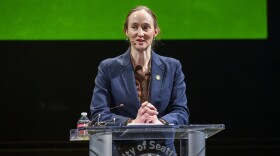In the legislative session that ended Sunday, Washington lawmakers had to tackle a huge budget deficit estimated to be as much as $16 billion over four years. Their new budget road map seems to close that gap by outlining a combination of tax hikes and spending cuts.
Olympia correspondent Jeanie Lindsay joined KNKX Morning Edition host Kirsten Kendrick to talk about how things came together at the very end of the 105-day session.
Click “Listen” above to hear their conversation, or find the transcript below.
Transcript
Note: This transcript is provided for reference only and may contain typos. Please confirm accuracy before quoting.
KNKX Morning Edition host Kirsten Kendrick: Before we get into how lawmakers closed the gap, Jeanie, remind us where it came from in the first place.
Olympia Correspondent Jeanie Lindsay: Yeah, this gap was caused by a combination of things. There was some promised new spending, including state workers who are getting big pay boosts after collectively bargaining for those last year, and this was also happening as costs to provide services have ballooned. You know, state government is not immune to inflation. And then at the same time, expected revenue just wasn't coming in as quickly as lawmakers had previously planned. So officials sort of described it as 'a perfect storm.'
Kendrick: Well, let's start with what taxes were passed.
Lindsay: There are billions in new taxes in this budget that has passed out of the Legislature.
So, there's tax hikes on businesses. There are new sales tax on specific services like digital services, advertising, and temporary staffing and security. Lawmakers also raised the capital gains tax rate for people who make the most from their capital gains. Some long standing sales tax breaks were removed.
And then, there are also, a slate of tax and fee changes, including fees for the Discover Pass, which people get access to state parks, hunting and fishing licenses. And also nicotine pouches, just a combination of things. But those are some of the highlights.
Kendrick: And there were spending cuts as well, Jeanie, what are the deepest ones?
Lindsay: The areas that are going to see the largest cuts are really child care, behavioral health and higher education.
There are child care expansions that were promised, and those have essentially been delayed or scaled back. People will be asked to pay more on their co-pays for state child care programs. There's also behavioral health beds that were planned to come online, and those will be delayed. And the state is also reducing how much money it is sending to higher education.
There's also some facilities that are going to be closed; a women's prison, some re-entry centers, and then a residential facility for people with disabilities is also planned for a closure once those residents are no longer there after ending admissions to that center later this year.
Kendrick: So these things are all part of the budget that is now in the hands of Governor Bob Ferguson. Is it going to stick?
Lindsay: Well, Democrats in the Legislature sure hope so. Republicans meanwhile, sure hope not. Ferguson hasn't really given us any new information on his thinking about this. He didn't meet with reporters or take questions after session adjourned, but he did issue a pretty lengthy statement.
He praised lawmakers for including the things that he likes, not draining the state's rainy day fund, $100 million in local funding for law enforcement hiring. But he said about revenue, he intends to carefully review it over the next few weeks and reveal more about his thinking then. And this is all coming after lawmakers adjusted their plans based off of some of his feedback throughout session.
He's emphasized a cuts first approach this whole time. He didn't like their proposed wealth tax and they didn't include that in the budget. And he also told them, pretty late in session, he wanted to reduce the amount that they were proposing in tax hikes, and they whittled that down too. So we'll see over the next few weeks, if it was enough.
Kendrick: So we had heard rumblings over the last several months about the possibilities for a special session. What are the prospects for that now?
Lindsay: Well, there's a couple of things that could trigger that, right? So, if Ferguson decides to get rid of some really core components to these tax plans that the Democrats have sent him, that could pull lawmakers back into a special session.
The other thing too, that people have been talking about and just keeping an eye on is what happens at the federal level. If the federal government decides to dramatically scale back or cut federal funding in Washington state, that could also throw off the calculations here and result in lawmakers needing to come back.
The state does have reserves, and lawmakers kept the state's reserves intact in their budget, but that amount of money would be wiped out pretty quickly if the federal government decided to withhold more than $2 or $3 billion in funding. So there are a lot of different dynamics here, and we'll just have to wait and see.
Kendrick: Jeanie, thanks for walking us through all of this.
Lindsay: Yeah, you're welcome.








